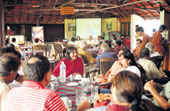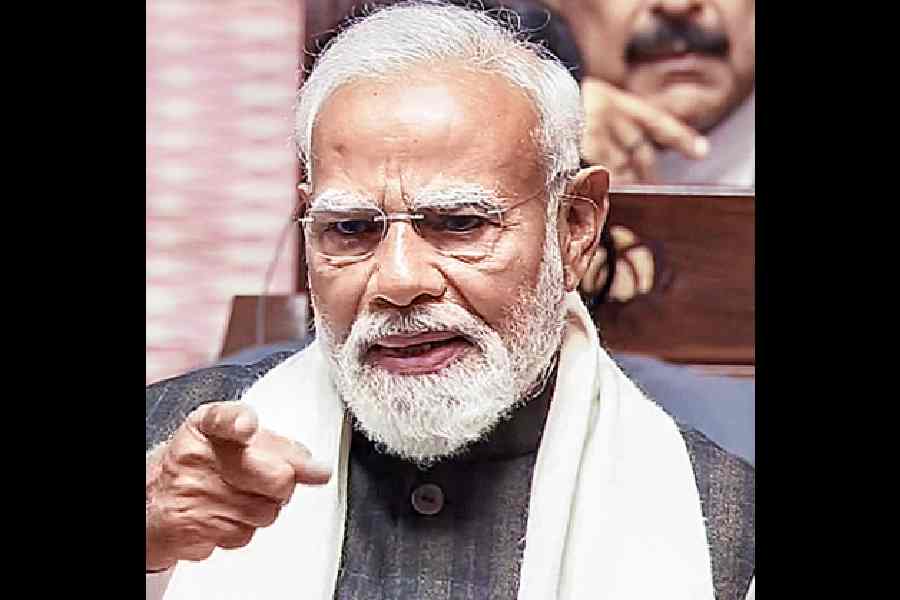 |
| Dressed to eat: The Shamiana of the Tollygunge Club allows casual dress |
Here’s a word of warning to those who want to be seen in the hip clubs of Calcutta: beware, you may be denied entry for not dressing properly. A petition filed with the Consumer Districts Forum in South 24-Parganas on October 17, 2006, deals with a specific case of an individual being denied entry to the Belvedere restaurant of Tollygunge Club, one of Calcutta’s most prestigious clubs.
Cases of refusal of entry because of improper dress have happened many times before. In 1997, a retired IAS officer, Padam Chandra Singhi, was denied entry at the Calcutta Swimming Club for wearing kurta pyjama. This year, the Calcutta Rowing Club refused entry to film maker Rituparno Ghosh for being similarly attired. There have been other instances, but what is special about this case is that it has been taken to a consumer court for redressal. Ajay Mitra, an advocate at Alipore Judges Court, mentions that this petition stands on very strong ground. “If a member has been refused entry arbitrarily then he is within his rights as a consumer to seek compensation and has a very strong legal argument in his favour,” he says.
Prabir Basu, the consumer lawyer who has taken up the case where the complainant is seeking a compensation of Rs 2 lakh from the club, claims that “this case is the first of its kind in India”.
The dispute lies in an incident that took place on December 23, 2004. Dr A.P. Dutta, former head of the department of orthopaedic surgery, National Medical College, Calcutta, had invited some friends for dinner at Tollygunge Club’s Belvedere Restaurant. “One of my guests happened to be wearing Jodhpur breeches and kurta with covered shoes. But the manager of the restaurant said that this dress would not be allowed as per the dress regulation of the club and by order of the chief executive and managing member, Air Commodore (retd.), K.B. Menon,” says Dutta.
Dr Dutta says that thereafter he approached Menon seeking entry for his guest. But his request was refused and he was instructed to take his guest to a table at the 18th Shamiana where snacks are served.
According to Dr Dutta, “We were taken to the Shamiana where the floor was full of dust, the tables were unclean and flies hovering all around.” He made another request to enter the Belvedere restaurant and was refused a second time. “I asked Mr Menon to show me the rules and regulations regarding dress restrictions and I was promised that a copy of this would be sent to me. But that has not been done to date,” recalls Dutta. But then, every club has the right to frame its rules and regulations and members are supposed to abide by these. The Calcutta Club, another premier club of the city, is also particular about what its members wear. “ Members are expected to wear a jacket and a tie in the dining hall during winter,” reveals Subroto Sen, CEO of Calcutta Club. Sen emphasises that shorts, jeans and round-necked T-shirts are not allowed. The International Club also has a similar set of rules. “Kurta with jeans is not allowed and sandals without backstraps are not permitted,” says Jayjit Biswas, secretary of the International Club.
“A private club may make its own set of rules to run the club and it can definitely have its own dress code,” notes Joymalya Bagchi, an advocate at Calcutta High Court. Bagchi says a valid legal point on dress code can only be raised when a dress code imposed by government organisations specifically violates public policy or if any action was taken debarring entry to a member when a rule relating to a dress code was absent .
For his part, Menon, the club’s chief executive, in a letter to Dr A.P. Dutta dated 16th March, 2005, explained, “There are innumerable occasions when members bring in guests who are not attired as per the club’s rules and yet we try and accommodate them to the extent possible so as to cause the least amount of embarrassment to the member. This may not be to the complete satisfaction of the member but under the circumstances, the club does not have very many options.” In the same letter, Menon said that as a “very senior member of the club, Dutta should have been fully aware of the dress norms and ideally his guests should have been advised accordingly”. Menon also mentioned that to avoid any embarrassment to members, the specified dress code of the club had been issued.
Dr Dutta, however, challenges the contention in his petition. “At the time when this incident occurred there was no specific dress code barring the entry of someone wearing Jodhpur breeches and kurta. The circular talked about by the club was given only on February 1, 2005, after the incident occurred.”
But a media report on March 4, 2004, mentions that the Tollygunge Club had sent a circular debarring members from entering the club premises in traditional apparel like kurta pyjama. Dutta claims he never received any such circular. Menon, however, stresses that the circular was sent out before the incident took place.
Since the petition has been filed in the consumer court, questions arise about the status of club members as consumers. Dikkhabrata Choudhury, a consumer lawyer and executive secretary of the Consumer Unity and Guidance Forum, says that club members can be treated as consumers. According to a ruling of the Supreme Court of India in 2004, a member of a cooperative society or a club can be treated as a consumer. The ruling, lawyers say, empowers an aggrieved party in a dispute involving cooperative societies and clubs to approach a consumer forum for redress.
Meanwhile, Menon says that the Tollygunge Club has not yet received any legal notice. “Club dress conventions have been in place since 1895. There is no change in our position from what correspondence has taken place between Dr Dutta and the Tollygunge Club.” He adds that, “We permit the national dress for all functions, including the new year event, and dhoti punjabi is permitted in the Club on all occasions.” He says he will respond to the charges when he receives the legal notice.
Prashanta Banerjee, a lawyer at Alipore Court and a member of the Consumer Court Bar Association, says that if a member was caused harassment by “arbitrary action” on behalf of the club, he is certainly entitled to compensation by the club. Anjan Dutta, a lawyer at Judges Court, states that in this case the club has to prove that there has been no deficiency in its services to the member.
In the correspondence between Dr Dutta and the Tollygunge Club, the club repeatedly emphasised that it acted according to its own rules. Dr Dutta claims it has not and that he has been forced to seek remedies available to him under the law. The outcome will reveal who adhered to the code properly.










